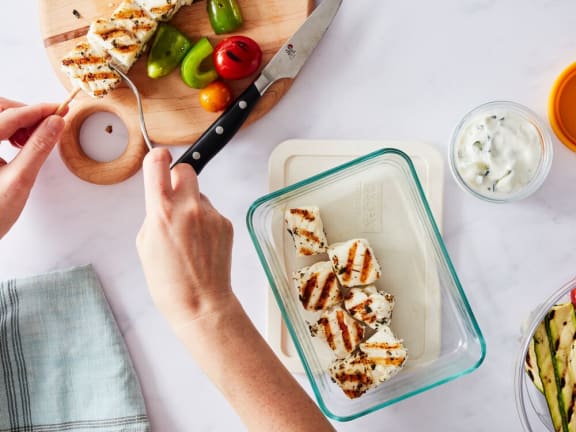
How Long Does Fish Last in the Fridge?
July 9th, 2025Best Ways to Store Seafood for Freshness and Quality
Knowing how to properly store fish at home can be the difference between a delicious, high-quality meal and a disappointing one. Whether you’re storing frozen or thawed fish in your freezer or refrigerator, here’s everything you need to know to keep your seafood tasting its best.
How to Store Fish in the Fridge
If you’re planning to cook your fish within a couple of days of receiving it, the refrigerator is your best option for storage. But there’s a right way — and a wrong way — to do it.
For optimal freshness, remove your fish from any vacuum-sealed packaging, then place it in a covered container or resealable bag to prevent drying out. You can also seal it tightly in plastic wrap or moisture-proof paper until ready to cook. Alternatively, if you're planning to cook raw fish within a day, you can simply store it in a bowl or on a rimmed plate, uncovered.
Set the fish in the coldest part of your fridge, ideally in a dedicated meat drawer or on the bottom shelf where temperatures are most consistent and the risk of cross contamination is reduced.
How Long Can Raw Fish Stay in the Fridge?
So, how long does fish last in the fridge this way? Generally, raw fish can be safely stored for up to 2 days. If you’re not going to use it within that period of time, your best bet is to store it in the freezer. Read more about storing fresh seafood in the fridge.
How Long Can Frozen Fish Last in the Freezer?
Our recommendation is to enjoy frozen fish within 3 months for optimal taste and texture. However, vacuum-sealed fish stored at a consistent 0°F or lower can maintain quality for up to a year. Beyond that, you may notice changes to its quality, but the fish is safe to eat indefinitely.
When done properly, freezing is a smart way to preserve the quality, texture, and flavor of wild-caught fish. The key is preventing air exposure and temperature fluctuations, which can lead to freezer burn and off flavors over time. For optimal freshness, we suggest storing frozen fish in the freezer until you know you’re ready to cook it.
How Long Can Cooked Fish Stay in the Fridge?
Cooked fish has a slightly longer shelf life than raw seafood. We generally advise to use leftover cooked fish within three to four days of cooking. After that, you run the risk of eating spoiled seafood. If you don’t expect to consume within that timeframe, it’s safe to refreeze the cooked fish while it’s still fresh.
Storing Cooked Fish

Leftovers can be just as tasty as the original meal — if stored correctly. To store cooked fish, allow it to cool completely before transferring it to an airtight container. Then place it in the fridge, where it will stay fresh for up to 3 or 4 days.
If you’d rather freeze your cooked fish for future meals, portion it into individual servings and freeze in sealed containers or freezer bags. It’s a good idea to label the container with the date and type of dish for easy reference.
Frozen cooked fish is best enjoyed within the month, as the quality will degrade relatively quickly in a home freezer, compared to a commercial freezer. Vacuum-sealing the cooked fish can help extend its quality beyond a month, but is not necessary to do. Keep in mind that the cooked fish will be safe to consume indefinitely, as long as it’s been stored properly at safe temperatures in the refrigerator and freezer.
Bonus: Cook Straight from Frozen

One of the perks of frozen fish is that you don’t have to wait for it to thaw. With the right technique, you can go from freezer to table in under 30 minutes. Whether you’re pan-searing, baking, or air-frying, cooking fish from frozen is easier than you might think.
Proper storage is key to maintaining the flavor, texture, and nutritional value of wild-caught fish. Whether you’re planning to cook tonight or stock your freezer for the month ahead, these tips will help you get the most out of every fillet.
How to Tell If Fish Is Bad
According to the USDA, one way you can tell if fish is bad is by smelling it. Uncooked spoiled seafood can smell sour, rancid, fishy, or like ammonia. These odors become stronger after cooking. If you pick up any of these scents in cooked fish, whether faint or potent, don’t eat it.
Fish that’s spoiled will also have a change in appearance different from when it was first defrosted, such as a change in color, or a visible change in its texture. And if you decide to taste your salmon to determine if it’s fresh, it will have an off or sour taste to it.
Get Access to the Best Wild-Caught Fish
Be sure to stock your kitchen with sustainably-caught fish and shellfish by sourcing your seafood online from Wild Alaskan Company. You’ll get high-quality, wild-caught seafood delivered straight to your doorstep. Choose your fish subscription box today.





